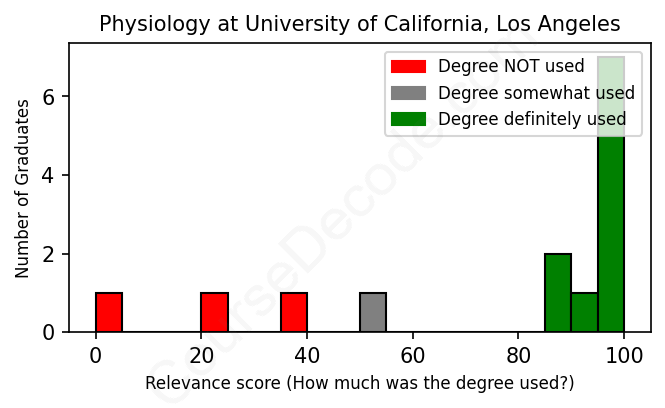
First, some facts. Of the Physiology graduates from University of California, Los Angeles we've analyzed , here's how many have used (or NOT used) their degree in their career:

These are estimates based on AI analysis of 14 LinkedIn profiles (see below).
The verdict? Above average. Overall, with an average relevance score of 76%, Physiology graduates from University of California, Los Angeles have a higher likelihood (+9%) of finding work in this field compared to the average graduate across all fields:
And for comparison, here's the chart for all profiles we've looked at across all degrees.
Also, after graduating, 57% of these graduates have pursued further education other than another Bachelor's degree (such as a Masters degree or other), compared to the average across all profiles of 35%. This suggests you may need more than just a Bachelors degree to be competitive as a Physiology graduate.
See the details:
|
Relevance score: 100% We think this person has gone into a career highly relevant to their degree. We think this person has gone into a career highly relevant to their degree.
DEGREE INFOGraduated in 2022 from University of California, Los Angeles with a Bachelor's degree in Physiology. No other secondary education since. JOB HISTORY SINCE GRADUATIONOphthalmic Technician Beverly Hills Eye Associates Jun 2022 - Present ABOUTNo information provided. |
The top 10 most common jobs done by the graduates we've analyzed (ranked most common to least) are:
When looking at the career paths of people who graduated with a degree in Physiology from UCLA, it's interesting to see that there's quite a variety of jobs they ended up in. The most common roles include positions in the healthcare field, especially within pharmacy and physical therapy, which require a direct application of physiological knowledge. For instance, jobs like pharmacists, clinical pharmacists, and physical therapists directly build on the understanding of human biology and body functions learned in their degree. It's clear that many graduates leverage their education when working closely with patients or in medical environments.
On the flip side, there’s a significant number of graduates who ventured into fields that don’t really align with their physiological background, like software engineering and quality assurance roles, where the connection to physiology is pretty weak. Positions like Quality Assurance Managers or Account Managers largely focus on skills unrelated to their academic training, indicating that not all graduates stick to careers closely related to physiology. Overall, while many alumni found fulfilling roles in healthcare that highlight their education, others ended up in sectors where their degree plays a minimal role in their day-to-day tasks.
Here is a visual representation of the most common words in job titles for Physiology graduates (this is across all Physiology graduates we've analyzed, not just those who went to University of California, Los Angeles):

When you look at the career trajectories of UCLA's Physiology graduates, you’ll notice a mix of paths, but many seem to revolve around healthcare and roles that involve some aspect of health sciences. For instance, shortly after graduation, many individuals took on healthcare-related positions like pharmacy interns, medical scribes, or even roles in physical therapy. This suggests that a good number of these graduates found their way into the medical field quite quickly, which is great news if you're considering a career related to physiology!
However, as time passes—let’s say about five to ten years later—some of the graduates also branch out into various roles that might not be directly related to physiology. You’ll see things like quality assurance engineers in tech companies or even community health program managers. While these paths can still be fulfilling, they might stray a bit from the core science background that many would expect from a physiology degree. Overall, while it appears that a significant number of graduates begin their careers in relevant health-related jobs, there are also those who shift towards diverse fields, which could be a positive sign of versatility, or perhaps a slight indication of drifting away from what they originally studied. It's definitely something to think about as you plan your future!
Getting a Bachelor’s degree in Physiology at UCLA can be pretty challenging, so you should definitely be ready for some tough coursework. The program covers a lot of complex topics in biology, chemistry, and human anatomy, so if you’re not super into science, it might feel overwhelming at times. The workload can be intense with heavy readings, lab work, and exams, but if you’re passionate about understanding how the body works, it can also be really rewarding. Overall, it’s kind of on the tougher side compared to some other majors, so just be prepared to put in the effort!
Most commonly, in the LinkedIn profiles we've looked at, it takes people 4 years to finish a Bachelor degree in Physiology.
Looking at the job paths of these UCLA Physiology graduates, it seems some have landed pretty decent gigs, especially those who ventured into pharmacy and quality assurance roles. For example, the pharmacists generally climb the ladder relatively quickly, with positions like Pharmacy Manager and Lead Clinical Pharmacist, which usually come with good salaries. The Quality Assurance Engineers seem to have a solid career trajectory too, moving up to senior manager roles at notable companies like Hulu and PlayStation, which probably means they're doing well financially. On the other hand, some folks in teaching and the medical field are starting lower on the pay scale, especially if they’re just beginning their careers like some recent grads working as medical scribes or assistants. Overall, it looks like a mix—some are making bank while others are just getting started or might need a bit more time to hit the big bucks!
Here is a visual representation of the most common words seen in the "about" section of LinkedIn profiles who have a Bachelor degree in Physiology (this is across all Physiology graduates we've analyzed, not just those who went to University of California, Los Angeles). This may or may not be useful:

Here are all colleges offering a Bachelor degree in Physiology (ordered by the average relevance score of their Physiology graduates, best to worst) where we have analyzed at least 10 of their graduates:
| College | Score | Count |
|---|---|---|
 University of Arizona University of Arizona
|
77 | 25 |
 University of California, Los Angeles University of California, Los Angeles
|
76 | 14 |